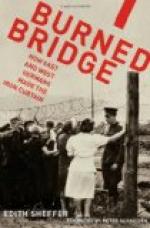“And there are valleys and valleys,” he said thoughtfully; “when they are cleared and cultivated there is endless room in them for people who want elbow-room, who want to live without riding on the other fellow’s back.
“Better get in with us, Wes,” he said abruptly. “I’m getting old. It won’t be long before I have to quit. This thing will need a pilot for a long time yet. Men will always have to have a leader. You can do good here. Big oaks, you know, from little acorns. I mean, if this project continues to achieve success, it might blaze the way for a national undertaking. We said that a country that was worth living in was worth fighting for. We are liars and cheats if we do not make it so for those who did our fighting.”
“I wouldn’t mind taking a hand in this game,” Thompson said. “But the war is still on. If that were over—well, yes, Toba Valley looks good to me.”
“You aren’t out of it for good, then?”
Thompson shook his head.
Carr put his hand on Thompson’s shoulder. “Ah, well,” he said. “It won’t be long now. You’ll be back. You can put on an aerial mail service for us, as your first undertaking.”
He chuckled, and they left their log and strolled back toward the house.
* * * * *
“Come and I’ll show you what the valley looks like, Wes,” Sophie said to him, when they had finished dinner, and Carr had his nose buried in mail just that evening arrived.
She led him a hundred yards upstream to where a footbridge slung upon steel cables spanned the Toba, crossed that and a little flat on the north side, and climbed up the flank of a slide-scarred hill until she came out on a little plateau.
“Look,” she waved her hand, panting a little from the steepness of the climb.
Five hundred feet below, the valley of the Toba spread its timbered greenness, through which looped in sweeping curves the steel-gray of the river. In a great bend immediately beneath them lay the houses of the settlement, facing upon the stream. Farther along were isolated homesteads which he had not seen. Back of these spread little gardens, and the green square of cultivated fields, and beyond in greater expanse the stump-dotted land that was still in the making.
The smoke of the donkey-engines was vanished, fires grown cold with the end of the day’s work. But upriver and down the spoil of axe and saw lay in red booms along the bunk. He could mark the place where he had stood that afternoon and watched a puffing yarder bunt a string of forty-foot logs into the booming-ground. He could see figures about in the gardens, and the shrill voices and laughter of children echoed up to them on the hill.
“It is a great view, and there is more in it than meets the eye,” Thompson said. “Eh, little woman? The greatest war of all, the biggest struggle. One that never ends. Man struggling to subdue his environment to his needs.”




